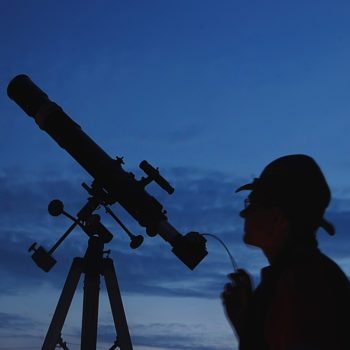Why We Love It
-
$90,210Potential Avg. Salary
-
9.3%Job Growth Rate
-
Growing DemandJob Outlook
-
InvestigativeCareer Attribute
Meteorologists are scientists that study weather patterns and changes and predict upcoming weather conditions. They create weather forecasts, predict weather events like storms, tornadoes, and hurricanes, and provide the public with safety guidance during severe weather.
Recommended Schools
What is a Meteorologist?
The following job responsibilities are common for individuals in meteorologist roles:
- Use barometers, computer models, weather balloons, satellites, and radars to predict upcoming weather patterns and severe weather incidents
- Compile weather forecasts for a single or multiple locations, predicting high and low temperatures and rain, thunder, and snow storms
- Study atmospheric changes for evidence of severe weather like hurricanes and tornados
- Generate graphics to be used in weather forecast presentations to illustrate concepts to audiences
A Day in the Life
Meteorologists are scientists that study and predict weather patterns and changes. While the most recognizable meteorologists are those that appear as weathermen on the news, each weatherman is backed by a variety of other meteorologists who help with weather prediction responsibilities. Some meteorologists focus their work on forecasting predictions for a single area, some create forecasts nationally, and some focus on researching a specific type of weather, such as tornados or hurricanes.
While knowing what the high and low temperatures will be for the day and when to take an umbrella to work are nice things to know, the most important work for a meteorologist is less about minor weather shifts and more about forecasting emergency weather situations. Meteorologists play a crucial role in keeping people safe during emergency weather situations because they provide advance warnings of impending severe weather and offer education on how to stay safe during severe weather situations.
Beyond predicting weather changes and severe weather, meteorologists also research the weather, look for major alterations in the atmosphere, and work to design more advanced tools for weather prediction. Meteorologists may work alongside computer programmers to develop new software that allows for simpler or more accurate predictions, or they may work alongside engineers to develop advanced tools for the collection of atmospheric data that aids in weather forecasting.
Typical Work Schedule
Most meteorologists work full-time schedules, but they may need to be available to work any shift—including overnight shifts—weekends, and holidays. Because weather events can form rapidly, it’s crucial for the public’s safety to have meteorologists monitoring weather conditions at all times.
Projected Job Growth
New weather prediction tools have made the process of forecasting and predicting weather changes more accurate than ever, increasing demand for meteorologists to work in the private sector for shipping and transportation companies. As a result, it’s expected that demand for meteorologists will grow in the coming decade.
Meteorologist Specializations
- Weatherman news anchors use the tools of meteorology to forecast local or national weather, and present their findings to viewers of broadcast news or weather stations.
- Weather forecasters work for news stations and the National Weather Service and do the legwork associated with predicting general weather conditions like high and low temperatures, visibility conditions, and likely precipitation.
- Research meteorologists focus their talents and expertise on studying specific weather events and atmospheric changes. They work alongside computer programmers, engineers, and other scientists to develop more accurate weather forecasting and prediction tools.
Typical Employers
The majority of meteorologists work for either the government as part of the National Weather Service, or for local/national news and weather reporting stations for companies like NBC, ABC, and CBS. Some meteorologists also work for shipping and transportation companies that transport people and cargo by land, air, or sea, and they predict upcoming weather changes to prevent loss of life, goods, or revenue as a result of severe weather.
Recommended Schools
How To Become a Meteorologist
The starting point for a career as a meteorologist is a bachelor’s degree with a major in a related field, such as meteorology or atmospheric sciences. After graduation, most meteorologists begin their careers in entry-level positions with the National Weather Service. This government role allows for thorough professional training after formalized education has been completed, requiring 200 hours of training per year under an experienced meteorologist for the first two years of employment.
For weather forecaster or weatherman news anchor positions, a bachelor’s degree and professional experience is usually sufficient for a successful career as a meteorologist. However, if you wish to advance into a research meteorologist role, you’ll need to earn one or more graduate degrees as well. A master’s degree in atmospheric sciences is usually the least amount of education required, and some positions may even require a Ph.D. in atmospheric sciences or a related role.
For meteorologists interested in reporting the weather on the news, an audition tape will be required. The audition tape should have impressive clips of you reporting the weather, and can usually be put together from internship experiences. With an audition tape, you can begin finding weatherman work in small U.S. news markets. With experience and more impressive audition clips, you may be able to work your way into large news markets and/or senior-level weatherman positions for news stations.
Meteorologist Salary Data
We’ve provided you the following to learn more about this career. The salary and growth data on this page comes from recently published Bureau of Labor Statistics data while the recommendations and editorial content are based on our research.
National Anual Salary
Low Range
$66,200Average
$90,210High Range
$132,180National Hourly Wage
Low Range
$32/hrAverage
$43/hrHigh Range
$64/hrHow do Meteorologist salaries stack up to other jobs across the country? Based on the latest jobs data nationwide, Meteorologist's can make an average annual salary of $90,210, or $43 per hour. On the lower end, they can make $66,200 or $32 per hour, perhaps when just starting out or based on the state you live in.
Salary Rankings And Facts
#95 Nationally for All Careers
Above Average Salary Nationally
Programs and Degrees
Here are the most common degrees for becoming a Meteorologist. a is usually recommended and specifically a degree or coursework that prepares you for the particular field, see below.
Highest Education Among Meteorologists
- 11.1% Doctorate
- 24.7% Masters
- 44.7% Bachelors
- 9.2% Associates
- 10.2% College
- 0% High School
- 0% Less than High School
Job Growth Projections and Forecast
2014 Total Jobs
11,8002024 Est. Jobs
12,900Job Growth Rate
9.3%Est. New Jobs
1,100How does Meteorologist job growth stack up to other jobs across the country? By 2024, there will be a change of 1,100 jobs for a total of 12,900 people employed in the career nationwide. This is a 9.3% change in growth over the next ten years, giving the career a growth rate nationwide of Above Average.
Growth Rankings And Facts
#225 Nationally for All Careers
Above Avg. Growth Nationally
What Companies Employ The Most Meteorologists
| Industry | Current Jobs | New Jobs Needed | % Increase |
|---|---|---|---|
| Federal government, excluding postal service | 3,100 | -300 | 0% |
| Research and development in the physical, engineering, and life sciences | 2,500 | 100 | 0% |
| Television broadcasting | 700 | --- | 0% |












